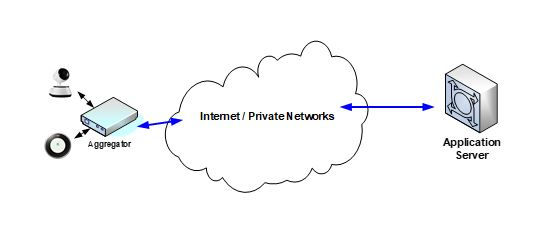As more and more IoT devices are deployed in mission critical applications, securing IoT networks presents a number of unique challenges [1]. According to Eclipse IoT Working Group’s 2017 IoT developer survey [2], security is the top concern for IoT developers.
The IoT security challenges include:
Authorize and authenticate devices
Manage device updates
Secure communication
Ensure data privacy and integrity
Secure web, mobile, and cloud applications
Ensure high availability
Detect vulnerabilities and incidents
Predict and preempt security issues
DomaniSystems’ approach to IoT security relies on the use of a combination of Machine Learning, BlockChain Technology and Containerization.
The figure below illustrates how Internet of Things (IoT) nodes can be managed by a server or a set of servers.

Referring to Figure 1, part of the security management software resides in the Aggregator and another part resides in the Application Server(s), with both parts written in an executable programming language like C. The purpose of these software blocks in the aggregator and the server would be, for example, to ensure that the interaction between the aggregator and the server is secure and meets established performance requirements. The private network referred to in Figure 1 could be based on a number of technologies like Carrier Ethernet or a private Blockchain networks.
To develop and enable applications such as mission-critical and secure IoT networks, one needs a platform that can be used to develop the software residing in the network’s sensors, actuators, aggregators, and servers. Additionally, simulation capability is needed to ensure that a network consisting of a large number of aggregators and servers ultimately operates with the performance and security needed for its intended application.
DomaniSystems’ DCP platform’s design objective is to address these requirements.
References:
Comentarios